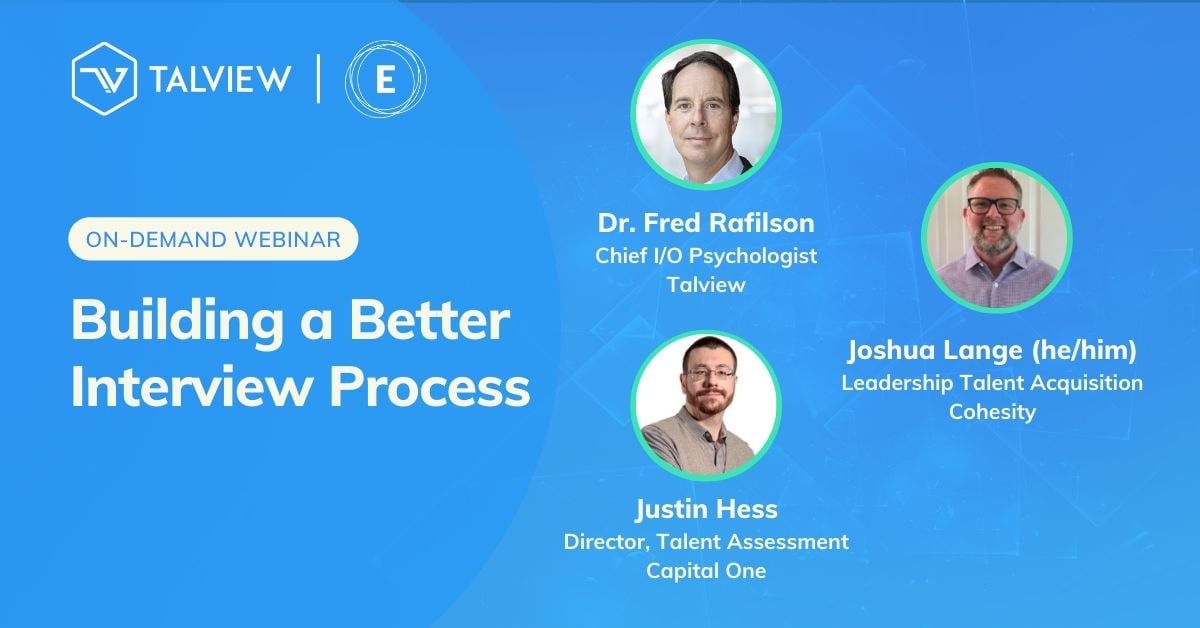Disruptions in the talent acquisition market continue with economic uncertainty and fears of a recession. Recruiting teams around the globe are struggling to meet hiring goals. While several high-profile tech companies are conducting much publicized layoffs, organizations and companies of all sizes are scrambling to find the right talent for a multitude of open positions. The worldwide need for skilled workers continues to grow.
A recent panel of enterprise talent acquisition experts was assembled for an ERE webinar: Building a Better Interview Process. Their discussion reflected the growing complexity of hiring decisions and the rising cost of bad hires.
A principal focus for their discussion was the candidate interview. The more hiring managers understand about how to conduct an interview, train their interviewing teams, and get reliable information from candidates, the greater the improvement to their overall quality of hire.
Topics discussed included:
- Effectively developing rapport with candidates
- Positioning the company as a best place to work and communicating the employee value proposition (EVP)
- Defining what success in a role looks like and sharing this information with candidates
- Uncovering job-related information from candidates through relevant interview questions
- Following a best-practice framework for conducting interviews
Panelists for the Webinar on Interviewing
- Dr. Fred Rafilson, Chief I/O Psychologist, Talview
- Joshua Lange, Leadership Talent Acquisition, Cohesity
- Justin Hess, Director, Talent Assessment, Capital One
Selected Excerpts from the Webinar
“From the pandemic to the great resignation and the growing skills gap, talent acquisition (TA) leaders are struggling to meet their hiring goals. The candidate interview is the most common component of virtually all hiring processes and yet it continues to be a source of inconsistency, inefficiency, and unreliable data.
This is something that industrial and organizational psychologists and TA leaders really struggle with and want to solve. I believe that while most interviewers are well intentioned, they frequently find it hard to elicit information that is predictive or indicative of a candidate's likelihood of success on the job.
It's tough to do an interview that is predictive. Interviewers often fail to probe some of the most important topics. They lack an understanding of how to rate a candidate in a reliable and accurate manner.
Most interviewers are not trained in the skills required to interview a candidate.
Given the importance of the interview in talent acquisition, do you find ensuring your interviewers have the skills they need to conduct an effective and a fair interview is a challenge?”
The Interview is an Assessment
“Interviews are assessment tools. If you think of most assessments, there is some sort of training or certification for the people who administer it. I feel like interviews are often misunderstood. They’re often left out of that kind of certification process, and so what you have is generally a stable of interviewers. Sometimes it depends on your company's size. It could be maybe just a few of the most senior leaders if you're in a smaller stage startup. It could be hundreds, sometimes even thousands, if you're in a much larger enterprise organization that may or may not get that requisite training.
Interviewing is an art and a skill. It should be a structured conversation.
It's also important to call out that there are different types of interviews. You have job-fit interviews, behavioral interviews, you have more technical interviews, and each one requires a different type of training.
I think there's some commonalities across interviews, like diversity and inclusion, that belong in almost all training, bias training, and so on, that span all the different types of interviews. I think sometimes, as companies and as an industry, we forget that interviews are assessment tools.”
Asynchronous Recorded Interviews
“Research is going on now looking at facial features, looking at speech patterns, looking at psycholinguistics. Looking at all of those things and comparing that data to gender, ethnicity, and other demographics over tens of thousands of interviews. We are going to see some cool things about what's actually happening (in the interview). What are the interactions, what are the results?
It’s interesting because there are clearly potential drawbacks. But they (digital tools) can save time and create inclusivity. A couple of positive points, maybe some useful information for our listeners out there to consider if they're thinking about bringing in a tool like asynchronous recorded interviews.
There's an additional layer of information that is provided based on psycholinguistics.
The benefits for high volume recruiting outweigh the possible detractors. If I were in a situation where I was looking at that tool in a high-volume situation, I would absolutely consider it and absolutely lean into something like. Right now, the detraction or the negative potential impact is so small that it's manageable.
Let me just be clear, the risk of a negative outcome is definitely manageable, so I would lean into a tool like that for high volume situations.
There's more going on with asynchronous interviews because certain companies are now using psycholinguistics. Not only can you hear the answers, you know the real responses to those questions.
Your hiring manager goes in tomorrow to look at the interview, learn about the candidate, and hear the direct responses to the questions posed. But there's an additional layer of information that is provided based on psycholinguistics. We can look at behavioral tendencies and get some competency information that the candidate isn't even aware of.
It’s going to be really cool to watch the future and see how much data we can actually gain from these types of interviews.”
The complete webinar is now available On-Demand, courtesy of Talview.
Interview Insights: Effective, Bias-Free & Scalable
By analyzing interview conversations and using AI-based cognitive services to assess the candidate’s performance AND the interviewers’ conformance to organizational policies, Talview Interview Insights brings specific and explainable insights to the interview process.








Leave a Reply